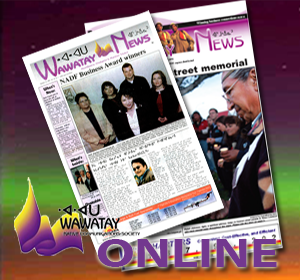The recently released Urban Aboriginal Peoples Study found that about 25 per cent of non-Aboriginal people interviewed in Thunder Bay said their view of Aboriginal people has worsened.
April 29, 2010: Volume 37 #9, Page A9
“As human beings, when we go through hard times, our natural reaction is to blame the most visible group of people,” said Nishnawbe Aski Nation Grand Chief Stan Beardy.
He said many people in Thunder Bay lost their jobs over the past few years and are frustrated because they are losing their homes and cannot provide security for their children.
“So as a result it becomes very convenient to blame somebody, which just happens to be First Nations people,” Beardy said.
Thunder Bay’s percentage of non-Aboriginal people who said their view of Aboriginal people had worsened was the highest across the country, with Regina and Winnipeg reporting 20 and 18 per cent respectively, Montreal and Halifax reporting 10 per cent each, Toronto reporting eight per cent and Vancouver reporting five per cent.
Kitchenuhmaykoosib Inninuwug Chief Donny Morris said the study findings may indicate the feelings of many Thunder Bay residents who have rarely associated with Aboriginal people before on a regular basis, but now have to with the rising Aboriginal population.
“Maybe it’s bringing out the 25 per cent who have never been involved with us,” Morris said. “Now they are starting to see more of us Indians so their true feelings are starting to come out.”
Completed by the Environics Institute, the study interviewed 2,614 First Nations, Metis and Inuit people living in major Canadian cities as well as 2,501 non-Aboriginal Canadians.
The study also confirmed the important role of education, a top priority identified by the Assembly of First Nations (AFN) and First Nation leaders across Canada.
“The survey reinforces First Nations’ own priorities, which include education and improving the quality of life in our communities,” said AFN Ontario Regional Chief Angus Toulouse. “The fact that urban Aboriginal people surveyed share these priorities demonstrates the importance of ensuring stable, secure education systems for First Nations no matter where they live and building strong and capable First Nations governments.”
The study can be found at the Urban Aboriginal Peoples Study website. http://uaps.ca/
CHIEF EXECUTIVE OFFICER (CEO)





Christmas is just around the corner and everyone is getting into the spirit of the holidays with music, decorations, department store shopping and stocking...
On December 2, 2025 during a Special Chiefs Assembly hosted by the Assembly of First Nations, the chiefs from across Canada voted unanimously to adopt an...